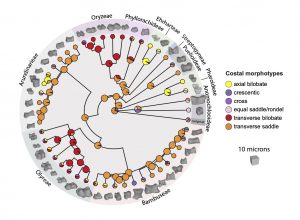3D shape analysis of grass silica short cell phytoliths
- Post by: Doris Barboni
- October 16, 2020
- No Comment
Gallaher, T.J., Akbar, S.Z., Klahs, P.C., Marvet, C.R., Senske, A.M., Clark, L.G., Strömberg, C.A.E., 2020. 3D shape analysis of grass silica short cell phytoliths: a new method for fossil classification and analysis of shape evolution. New Phytologist 228, 376–392. https://doi.org/10.1111/nph.16677
It has long been recognized that the three-dimensional (3D) morphology of grass silica short cell phytoliths (GSSCP) contain taxonomic information, but objective and quantitative ways of measuring it have been lacking. This paper attempts to solve this problem by devising a method to quantify 3D shape and size of GSSCP and use that information for taxonomic assignment within the grasses (Poaceae).
We studied GSSCP in leaves from 70 species in the early-diverging grasses (subfamilies Anomochlooideae, Pharoideae, and Pueliodieae), Bambusoideae, and Oryzoideae. We established the orientation of GSSCP morphotypes by observing cleared leaf samples. Isolated phytoliths were imaged using confocal microscopy, resulting in 3D models of GSSCP, which we analyzed using 3D geometric morphometrics. The analysis showed that nearly all established GSSCP morphotypes are significantly different from each other and that subclades of grasses can be separated based on their GSSCP shape and size.
We also applied our method to fossil GSSCP extracted from Eocene sediments from the central US and Turkey. Most of the fossils were classified as woody bamboos, with some assigned to the herbaceous bamboos, supporting previous interpretations.
All in all, 3D morphometrics is good news for phytolith science. It uses all of GSSCP shape (and size) to classify grass phytoliths and ensures objective and automatic classification of fossils. Upcoming publications will extend the method to the rest of the grasses (Pooideae, PACMAD).

